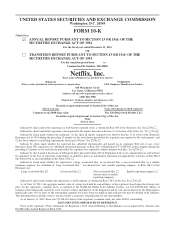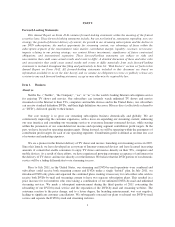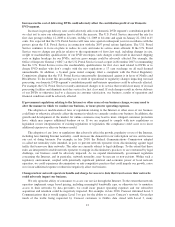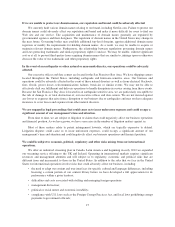NetFlix 2011 Annual Report Download - page 10
Download and view the complete annual report
Please find page 10 of the 2011 NetFlix annual report below. You can navigate through the pages in the report by either clicking on the pages listed below, or by using the keyword search tool below to find specific information within the annual report.typically between one and three years in duration and our business could be adversely affected if, upon
expiration, a number of our partners do not continue to provide access to our service or are unwilling to do so on
terms acceptable to us. Furthermore, devices are manufactured and sold by entities other than Netflix and while
these entities should be responsible for the devices’ performance, the connection between these devices and
Netflix may nonetheless result in consumer dissatisfaction toward Netflix and such dissatisfaction could result in
claims against us or otherwise adversely impact our business. In addition, technology changes to our streaming
functionality may require that partners update their devices. If partners do not update or otherwise modify their
devices, our service and our subscribers’ use and enjoyment could be negatively impacted.
If subscriptions to our domestic DVD segment decline faster than anticipated, our business could be
adversely affected
The number of subscriptions to our DVD-by-mail offering declined significantly following our price
change. We anticipate that this decline will continue. We believe, however, that the domestic DVD business will
continue to generate significant contribution profit for our business. In addition, we believe that DVD will be a
valuable consumer proposition and studio profit center for the next several years, even as DVD sales decline. The
contribution profit generated by our domestic DVD business will help provide capital resources to fund losses
arising from our growth internationally. To the extent that the rate of decline in our DVD-by-mail business is
greater than we anticipate, our business could be adversely affected. Because we are primarily focused on
building a global streaming service, the resources allocated to maintaining DVD operations and the level of
management focus on our DVD business are limited. To the extent that we experience degradation in service in
our DVD-by-mail business, subscribers’ satisfaction with our service could be negatively impacted and we could
experience an increase in cancellations, which could adversely impact our business.
If U.S. Copyright law were altered to amend or eliminate the First Sale Doctrine or if studios were to
release or distribute titles on DVD in a manner that attempts to circumvent or limit the effects of the First
Sale Doctrine, our business could be adversely affected.
Under U.S. Copyright Law, once a copyright owner sells a copy of his work, the copyright owner
relinquishes all further rights to sell or otherwise dispose of that copy. While the copyright owner retains the
underlying copyright to the expression fixed in the work, the copyright owner gives up his ability to control the
fate of the work once it had been sold. As such, once a DVD is sold into the market, those obtaining the DVD are
permitted to re-sell it, rent it or otherwise dispose of it. If Congress or the courts were to change or substantially
limit this First Sale Doctrine, our ability to obtain content and then rent it could be adversely affected. By way of
example, the Court of Appeals for the 9th Circuit has ruled that the First Sale Doctrine did not apply to sales of
software that contained contractual limitations on resales. To the extent such a ruling were extended to DVD
sales, our ability to obtain content for subsequent rental could be adversely impacted. Likewise, if content
providers agree to limit the sale or distribution of their content in ways that try to limit the effects of the First
Sale Doctrine, our business could be adversely affected. For example, we have entered into agreements with
several studios to delay the availability of new release DVDs for rental for a period of time following the DVDs
release to the retail market and, in connection therewith, these studios have prohibited certain of their wholesalers
from selling DVDs to us prior to such availability. Furthermore, certain content owners, from time to time, have
established exclusive rental windows with particular outlets. This happened in late 2006 and again in late 2007
when Blockbuster announced arrangements with certain content owners pursuant to which Blockbuster would
receive content on DVDs for rental exclusively by Blockbuster. To the extent content is to be distributed
exclusively and not to retail vendors or distributors, we could be prevented from obtaining such content, and
those of our competitors who access such content could enjoy a corresponding competitive advantage. To the
extent the content is also sold to retail vendors or distributors, under current law, we would not be prohibited
from obtaining and renting such content pursuant to the First Sale Doctrine. Nonetheless, to the extent content
owners do not distribute to us directly or through their wholesalers or otherwise establish exclusive rental
windows, it will impact our ability to obtain such content in the most efficient manner and, in some cases, in
8























